UCT’s increased focus on the SDGs
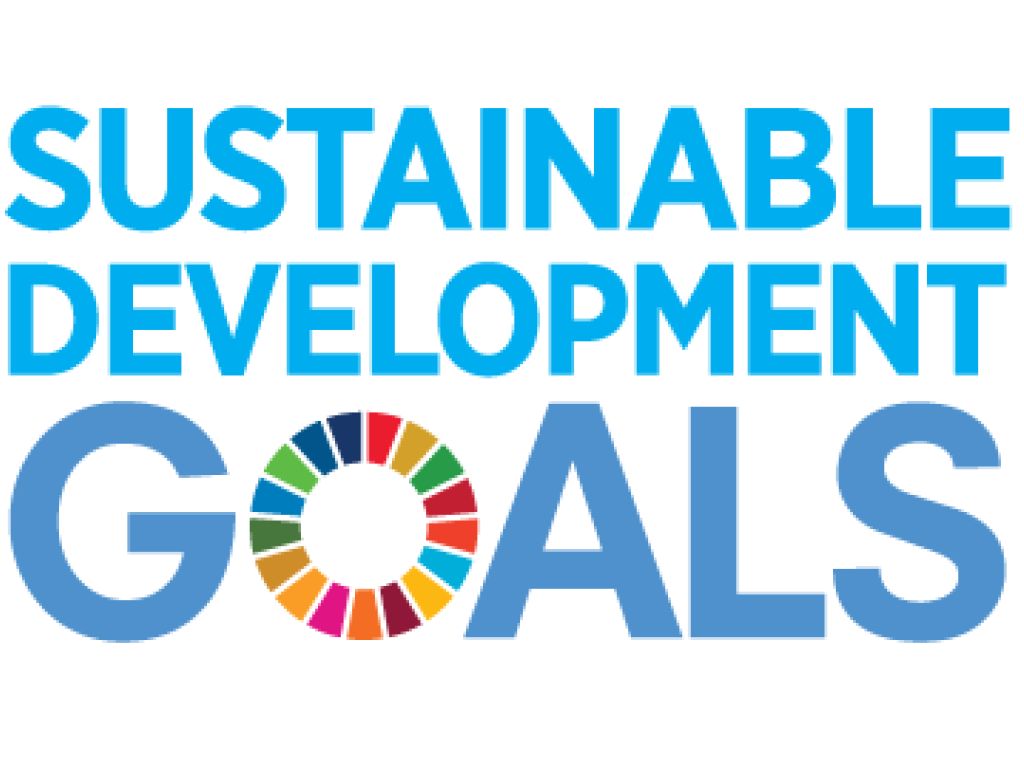
It has been three and a half years since the United Nations (UN) adopted the 2030 Agenda for Sustainable Development which includes 17 Sustainable Development Goals (SDGs). In July, South Africa will be among the 51 countries that will table voluntary national reviews of their progress towards addressing the SDGs at the 2019 High-level Political Forum on Sustainable Development to be convened by the UN Economic and Social Council. With the Vice-Chancellor, Prof Mamokgethi Phakeng having identified capacity building, collaboration, and engagement with government and industry as areas for the University to contribute to achieving the SDGs, several SDG-focused initiatives involving PII associate units are underway at the University of Cape Town.
The past
UCT’s link to the SDG process goes back as far as 2012 when PII member Prof Haroon Bhorat, director of the Development Policy Research Unit, School of Economics, provided critical research support to this global process. During this time (and while on sabbatical), he served at the United Nations Development Programme in New York City as head of research to the High-Level Panel of Eminent Persons to the Post-2015 MDG Agenda. This panel was appointed by the United Nations Secretary-General to advise on the global development framework beyond the Millennium Development Goals (MDGs) and comprised three presidents and other dignitaries from around the globe, including UCT Chancellor, Graça Machel.
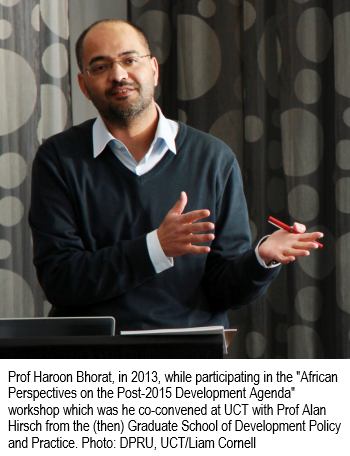
“The MDGs were incredibly important for the global fight for social and economic development, production, addressing poverty and inequality, and so forth,” says Bhorat. “But it was clear that the MDGs couldn’t just be rinsed and repeated by extending the goals for another period.”
While the MDGs process was criticised for a lack of consultation, the HLP earned praise from the UN Secretary-General for its inclusive and extensive consultations. “Whether the global donor community, foreign embassies that had development agencies, or tapping into regional research networks – we consulted a lot. One approach was to test initial ideas with the research-based Global Development Network at a workshop in Delhi and which was attended by one of the Panel members.”
The consultation process was complemented by commissioning research papers on broad themes such as the economy and jobs, migration, inequality, poverty, gender, climate change and institutions, to name but a few, to help inform the final framework for the SDGs.
“The whole process took around nine months to a year – it was intense”, Bhorat recalls. “A particular challenge for the High-Level Panel was to give voice to the rigour of research, on the one hand, versus what was understood as lobbying by various groups to ensure their interests were included in the SDGs – which in turn was going to be linked to funding – on the other hand.”
Some of the areas that generated plenty of discussion were migration, the labour market, and inequality. “Countries particularly from the global North had questions about what the goals would say about migration; so, for example the Swedish government hosted a workshop with relevant European ministries where the High-Level Panel presented forming views on migration.”
Discussions on reducing inequalities – which were not addressed by the MDGs – also caused “unease”, says Bhorat, “as the reality is that economic growth will always lead to inequality, to some form of maldistribution”. Hence, a concern was that, if a goal is purely focused on inequality, it could disincentivise those who are productive. In its report, the HLP identified inequality as one of the cross-cutting themes which is closely tied to the “leave no-one behind” principle of the 2030 Agenda. Further, Goal 10 of the SDGs explicitly aims to reduce inequalities within and between countries.
The role of research in setting the post-MDG agenda can well be illustrated by discussions concerned with the labour market and creating employment in particular. “If you set a jobs target you could send the wrong signal for governments to create large numbers of public sector jobs. Also, it would be ill-advised to use unemployment as a target because the real problem in many low-income countries is the working poor rather than unemployment. We had to do real innovative analytical work to get that message across.”
The graphic presentation (below) of 2011 data on the global working poor compared to the global unemployed illustrates this message clearly. Today, Goal 8 of the SDGs focues on the need for creating “decent work and economic growth”, and with many of the global targets of this goal addressing the plight of the working poor.
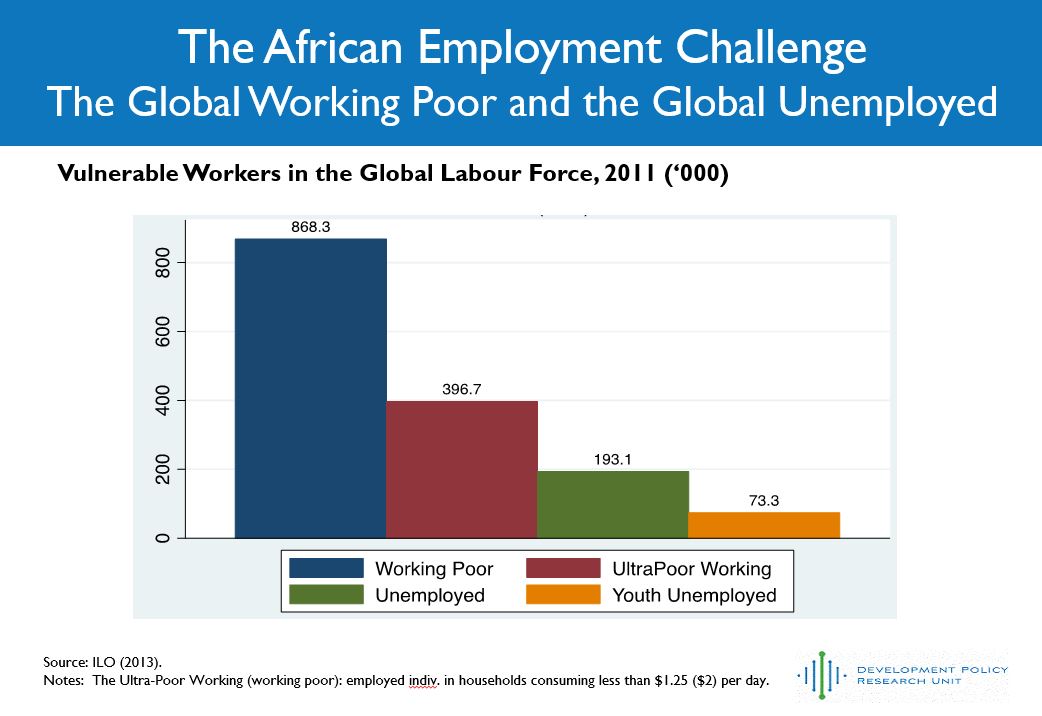
Bhorat also highlights a “phenomenally important win” in the post-MDG framework: that of a focus on the role of governance which is addressed by SDG 16: Peace, justice and strong institutions. “The MDGs didn’t address the role of governance. You can have lots of budget and plans for growth and poverty, fast-growing industries, etc., but if you have poor courts, a poor system of government, failing institutions, warring parties – all will undermine growth. That is why this goal is so important.”
A year later, in 2013, Bhorat and his counterpart at the (then) Graduate School of Development Policy and Practice (now The Nelson Mandela School of Public Governance), Prof Alan Hirsch, convened a workshop with African representatives from the policy and academic community to discuss the HLP report. The workshop was supported by the United Nations Development Programme and participants came from various countries and professional backgrounds (photo, below, received from the DPRU/Liam Cornell).
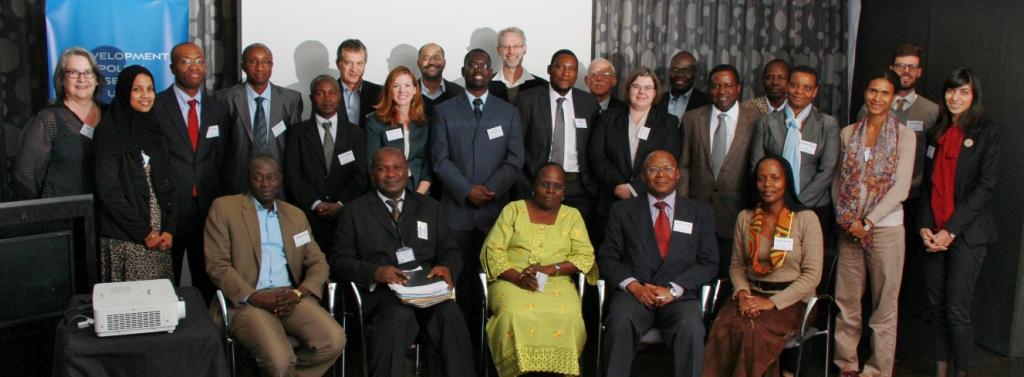
The present
While Bhorat currently is not formally tied to the global SDG process, UCT Vice-Chancellor Prof. Phakeng has recently appointed him as the university’s “SDG academic focal point” to help guide UCT’s strategic approach to engagement with the SDGs.
Guided by the VC’s vision of capacity building, collaboration and engagement with government and industry, Bhorat and a task team that was set up after a consultation with representatives from all faculties are currently exploring various approaches. These include setting up a database of SDG-related research publications by UCT researchers, a multiple purpose SDG website that profiles UCT work in this field, and possibly an international SDG conference.
Bhorat underscores the important of this focus: “All indications are that South Asia and sub-Saharan Africa lie at the core of how we think about the SDGs. It is in these regions where the majority of the work on social development needs to be done. Also, the SDGs exist across fields of expertise and vastly different areas of knowledge, but seldom are they brought together under one umbrella.”
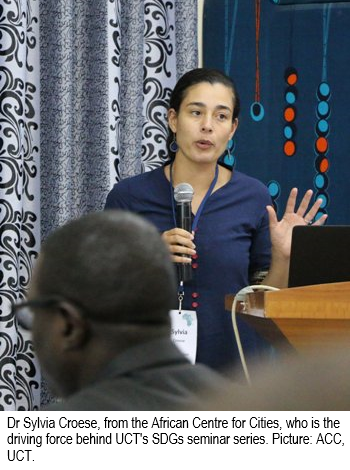
“The aim is to offer a space for different actors to come together to exchange thoughts, experiences and discussions related to the SDGs, with a particular focus on (South) Africa. We want to engage researchers and academics from the entire UCT community, but also practitioners, civil society, the private sector and city and other government officials.”
Croese is well placed to drive these engagements as she has been collaborating on several cross-country research programmes on localising the SDGs at African country or city level. She is currently an embedded researcher in the City of Cape Town as part of the MISTRA Urban Futures comparative research project on “Implementing the New Urban Agenda and the SDGs” and the principal investigator of the LIRA Agenda 2030 research project “Co-producing urban knowledge in Angola and Mozambique through community-led data collection: towards SDG 11”.
Croese has also co-authored the chapter on “Africa for the Global Observatory on Local Democracy and Decentralization”, facilitated by the United Cities and Local Governments association, which will inform the 5th Global Report on Local Democracy and Decentralization that will be presented at this year’s High-Level Political Forum on Sustainable Development at the United Nations.
The first seminar, on localising the SDGs in South Africa, was hosted at the ACC in February, and the next two are scheduled for 17 April and 15 May. The seminar series will run all year.
For more information on the SDG initiative, contact Sarah.Marriot@uct.ac.za; or Sylvia.Croese@uct.ac.za for information on the ACC’s SDGs seminar series.
Article by Charmaine Smith, PII communication manager, April 2019